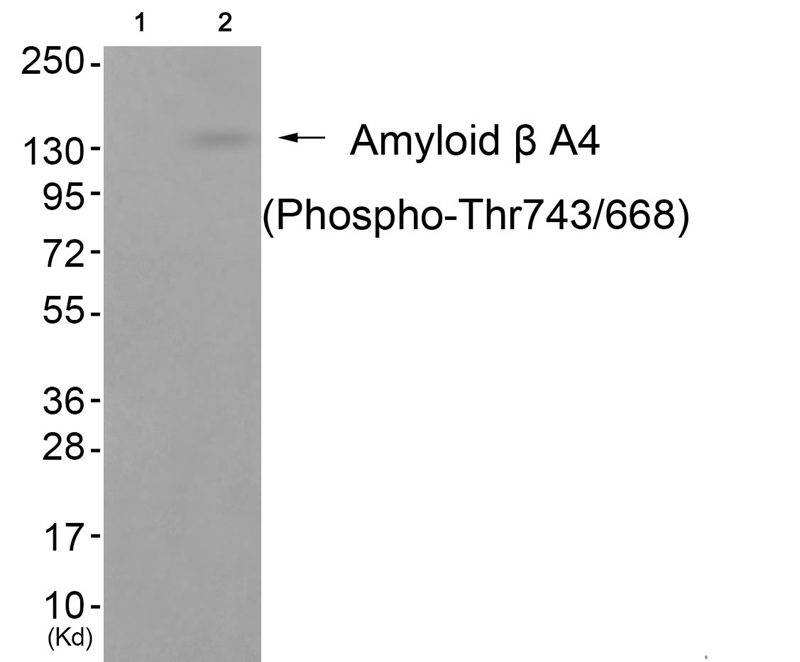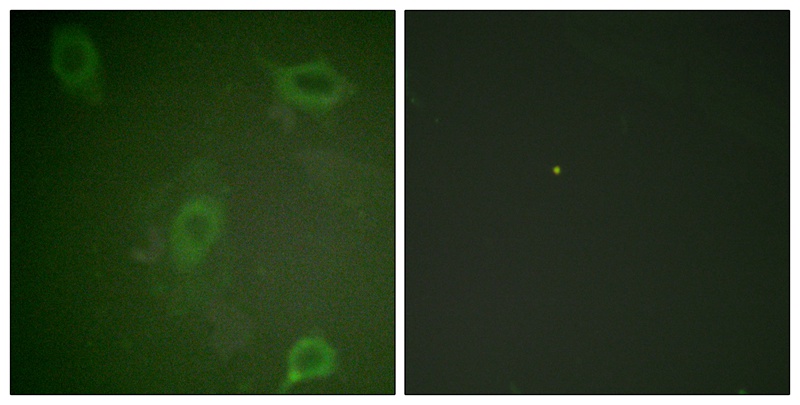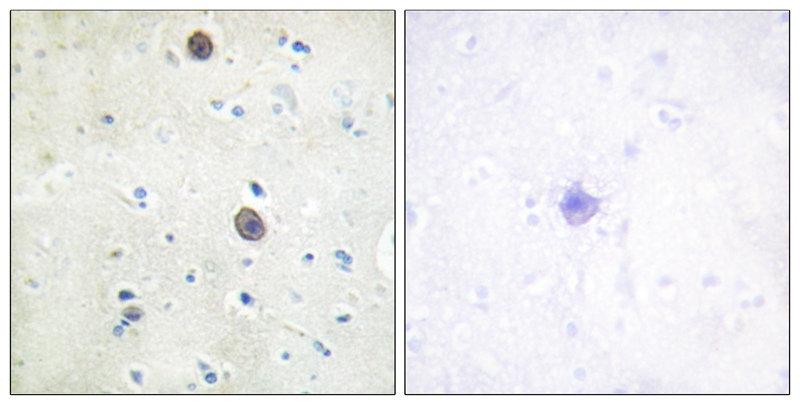


| WB | 咨询技术 | Human,Mouse,Rat |
| IF | 咨询技术 | Human,Mouse,Rat |
| IHC | 1/50-1/100 | Human,Mouse,Rat |
| ICC | 1/100-1/200 | Human,Mouse,Rat |
| FCM | 咨询技术 | Human,Mouse,Rat |
| Elisa | 咨询技术 | Human,Mouse,Rat |
| Aliases | A4; AD1; APP; APPI; Beta-amyloid protein 42 |
| Entrez GeneID | 351; |
| WB Predicted band size | 140kDa |
| Host/Isotype | Rabbit IgG |
| Antibody Type | Primary antibody |
| Storage | Store at 4°C short term. Aliquot and store at -20°C long term. Avoid freeze/thaw cycles. |
| Species Reactivity | Human,Mouse,Rat |
| Immunogen | Peptide sequence around phosphorylation site of threonine743 /668 (A-V-T(p)-P-E) derived from Human Amyloid β A4. |
| Formulation | Purified antibody in PBS with 0.05% sodium azide. |
+ +
以下是关于Amyloid β A4 (Phospho-Thr743/668)抗体的3篇参考文献及其简要摘要:
---
1. **文献名称**: *Phosphorylation of amyloid precursor protein at Thr668 mediates neurodegeneration*
**作者**: Lee MS, et al.
**摘要**: 该研究通过磷酸化特异性抗体检测阿尔茨海默病模型中APP Thr668位点的磷酸化,发现其与神经元凋亡和Tau蛋白异常磷酸化相关,提示该位点磷酸化可能通过激活GSK-3β加剧神经退行性病变。
---
2. **文献名称**: *Site-specific phosphorylation of tau and amyloid precursor protein by c-Jun N-terminal kinases*
**作者**: Colombo A, et al.
**摘要**: 利用Phospho-Thr668 APP抗体验证了JNK激酶对APP Thr668位点的磷酸化作用,并发现该修饰促进β-分泌酶(BACE1)对APP的切割,导致Aβ生成增加,为AD病理机制提供了新视角。
---
3. **文献名称**: *In vivo detection of phosphorylated amyloid precursor protein in transgenic mouse models of Alzheimer's disease*
**作者**: Sano Y, et al.
**摘要**: 通过免疫组化和Western blot分析,使用Phospho-Thr743/668抗体在AD转基因小鼠脑组织中发现该位点磷酸化水平升高,且与老年斑形成和认知功能下降显著相关。
---
**备注**:部分文献可能需结合具体研究背景调整检索关键词(如APP编号差异、种属特异性等),建议通过PubMed或Google Scholar以“Phospho-Thr668 APP”或“Phospho-Thr743 APP”进一步筛选。
The Amyloid β A4 (Phospho-Thr743/668) antibody is a specialized tool used in neuroscience research to study post-translational modifications of the amyloid precursor protein (APP), a key player in Alzheimer's disease (AD) pathogenesis. APP undergoes proteolytic processing by β- and γ-secretases to generate amyloid-beta (Aβ) peptides, which aggregate into toxic plaques in AD brains. Phosphorylation at specific threonine residues (Thr668 in APP695 numbering, corresponding to Thr743 in the longer APP770 isoform) regulates APP metabolism, trafficking, and interaction with adaptor proteins.
This antibody specifically detects APP phosphorylated at these residues, enabling researchers to investigate how phosphorylation influences APP processing and Aβ production. Studies suggest that Thr668 phosphorylation enhances APP cleavage by β-secretase, promoting amyloidogenic pathways. Its detection is critical for understanding AD mechanisms, as hyperphosphorylated APP fragments may contribute to synaptic dysfunction and neurodegeneration.
The antibody is widely used in techniques like Western blotting, immunohistochemistry, and immunofluorescence to assess phosphorylation status in cell lines, animal models, and human tissue samples. Its application aids in evaluating therapeutic strategies targeting APP phosphorylation or Aβ generation. However, users must validate specificity using appropriate controls, as cross-reactivity with other phosphoproteins may occur. This tool remains vital for unraveling molecular pathways linking APP modifications to AD pathology and identifying potential biomarkers or drug targets.
×